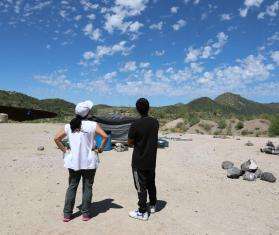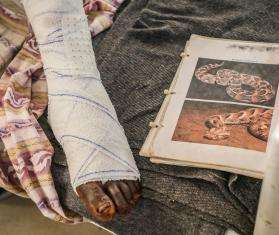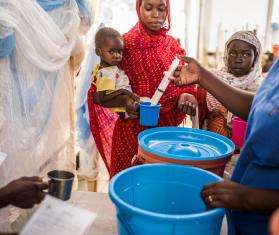The year 2024 marks 40 years of Doctors Without Borders/Médecins Sans Frontières (MSF) providing medical care in Mozambique. Over the past decades, our teams have responded to a wide range of emergencies, disease outbreaks, and conflict.
Since 1984, MSF has collaborated with local authorities and communities in Mozambique to deliver lifesaving medical assistance and support the authorities in strengthening access to health care.
As we look back at 40 years of medical humanitarian work in Mozambique, our teams remain committed to providing timely, effective, and innovative medical assistance to people in need. In 2023, MSF helped people affected by the conflict in Cabo Delgado, people living with advanced HIV, sex workers, youth at risk, and patients affected by neglected tropical diseases.

MSF in Mozambique 1984 - 2024
1984
MSF becomes the first medical humanitarian organization to operate in all provinces of Mozambique during the armed conflict.
1993 – 2000
MSF supports post-conflict health system reconstruction, provides response to cholera epidemics and floods in the capital Maputo, Gaza, and Limpopo in 2000.
2001
MSF starts working on HIV/AIDS.
2003
In collaboration with the Ministry of Health of Mozambique (MISAU), MSF starts treating patients with antiretroviral therapies in Maputo and Tete.
2004
MSF carries out the first cholera vaccination campaign in the country, in Beira, in collaboration with the Ministry of Health of Mozambique.
2008
MSF launches the Community Support and Adherence Group for people living with HIV in Tete, to increase access to antiretroviral treatment, improve treatment adherence, and reduce patient travel distances for medication and consultations.
2013
MSF starts a project in Maputo to provide care against drug-resistant tuberculosis. This year, we also responded to the flooding in Gaza province.
2014
In the cities of Beira and Tete, MSF offers HIV treatment and prevention care for at-risk populations, including sex workers, men who have sex with men, and transgender women.
2016
MSF starts treating viral hepatitis in Mozambique and initiates the provision of oral pre-exposure prophylaxis (PrEP) for HIV prevention in at-risk communities in Beira and Tete.
2016-2017
Assistance in mobile clinics to offer health services in the camp for displaced people in Espungabera and Manica.
2017
MSF, in collaboration with the Ministry of Health of Mozambique, responds to cholera through a vaccination campaign in Tete.
2018
With the opening of a community center in Maputo, MSF starts a harm reduction program for people who use drugs.
2019
MSF started to work in Cabo Delgado in 2019, delivering healthcare to people displaced by the conflict or returning to their homes. This year, MSF also responds to cyclones Idai and Kenneth, providing logistical and technical support to the Ministry of Health for a cholera vaccination campaign that reached 900,000 people and for treatment of the disease. In addition, MSF’s response focuses on water treatment, disinfection of contaminated water sources, and well cleaning.
2020
MSF provides primary health care, water, and sanitation for internally displaced people in Cabo Delgado province. In Maputo, we start an opioid substitution therapy (Methadone) program for people who use drugs.
2021
MSF supports the Ministry of Health in the COVID-19 response in Maputo, Beira, and Pemba. MSF expands its presence in Cabo Delgado and continues to support the conflict-displaced population with health services, including mental health care, as well as water and sanitation.
2022
MSF starts collaboration with the Ministry of Health in the province of Nampula focusing on neglected tropical diseases, vector-borne diseases, as well as emergency preparedness for cholera and natural disasters.
2023
MSF responds to the largest cholera outbreak in the last eight years in the country, in the city of Quelimane, in Zambezia province. In the coastal city of Beira, MSF runs several programs in partnership with local communities and the Mozambican Ministry of Health to expand access to safe abortion care. From January 2022 to June 2023, provision of safe abortion care at 11 clinics supported by MSF increased by 41 percent.
2024
MSF continues to be one of the few providers of health care for people affected by conflict in Cabo Delgado, in northern Mozambique. MSF supports three clinics in the village of Macomia and provides lifesaving assistance and medical care to people who have been displaced, including many who have forced to move multiple times.




